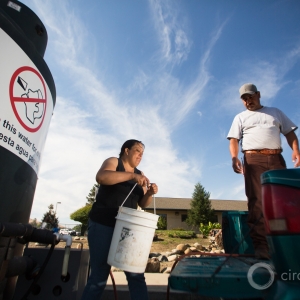Federal Water Tap, October 11: White House, Reversing Trump, Proposes Environmental Review Changes
The Rundown
- The White House intends to change the policies that govern environmental review of major federal actions.
- EPA nominates a new head of Region 5, which covers many of the Great Lakes states.
- The EPA provides grant funding to investigate the human health risks of pollutants in treated sewage sludge.
- The EPA and USDA release reports on climate adaptation.
- EPA officials give California agencies a deadline for an oilfield wastewater disposal plan.
- A House subcommittee will hold a hearing on drought response in the Colorado River basin.
And lastly, FEMA takes public comment on potential changes to floodplain management standards.
“We must protect our most vulnerable communities from unfettered pollution and the burden of forever chemicals and harmful contaminants. Many of the discharges being discussed today come at an extremely high cost to the health of humans and the environment, to local economies, and to local water treatment plants forced to bear the costs of removal.” — Rep. Grace Napolitano (D-CA) speaking at a House hearing on chemical contaminants in water.
By the Numbers
$6 Million: Grant funding supplied by the U.S. Environmental Protection Agency to four research institutes for investigating the human health risks of pollutants in treated sewage sludge. Euphemistically called biosolids, the sludge is spread on farm fields and turned into fertilizer for home gardens. The EPA inspector general said in 2018 that the agency lacked risk assessments for hundreds of chemicals found in biosolids.
In context: EPA Watchdog Flags Unregulated Pollutants in Treated Sewage Sludge
$15 Million: Grant funding from the EPA for water and sewage infrastructure projects in three Indigenous communities. The funds will help the Tuscarora Nation, in North Carolina; the Navajo Nation; and Tununak, which is an Alaska Native village.
News Briefs
NEPA Changes
The White House Council on Environmental Quality announced it will seek changes to the National Environmental Policy Act, the nation’s foundational environmental protection process.
As with other environmental laws, the Biden administration wants to undo changes wrought by the previous president. The CEQ proposes to reaffirm the environmental review process as a comprehensive, science-based assessment of impacts to air, land, water, cultural resources, and people.
The reconsideration of Trump-era changes will proceed in two stages. The first stage will focus on timely challenges. In this stage, the CEQ proposes focusing reviews on the public interest and a range of alternatives rather than primarily on the needs of the project applicant.
The CEQ also proposes removing restrictions on the scope of reviews and allowing considerations of a project’s direct, indirect, and cumulative effects. Such an analysis would allow a comprehensive look at pollution burdens.
New Head of EPA Region 5
Debra Shore, a veteran commissioner with the Metropolitan Water Reclamation District of Greater Chicago, will lead EPA Region 5, which covers many of the Great Lakes states, the Chicago Sun-Times reports.
Studies and Reports
Climate Adaptation at Federal Agencies
The EPA released a report detailing how the agency will incorporate climate adaptation into its policies, rulemakings, and procedures.
The report lists five priorities, including scientific analysis, collaboration with local government partners, and gathering relevant data. Perhaps foremost is a pledge to weave the impacts of climate change, especially on vulnerable communities, into its rules and policies.
The U.S. Department of Agriculture also released its climate adaptation report. The department says it needs to address risks for water quantity and quality. It can also use existing programs to encourage practices that build healthy forests and soils, which absorb more water and act as a buffer against dry periods.
The report acknowledges the need to invest in water efficient technologies and coordinate water management across landscapes.
Oilfield Wastewater Management in California
The EPA gave California agencies a mid-October deadline for completing a plan to align the underground disposal of oilfield wastewater with the protection of aquifers that could be drinking water sources.
The Bakersfield Californian reports that if state agencies miss the deadline they could face punishments such as withholding grant money or prohibiting the injection of salty wastewater into aquifers.
In context: Wastewater in California’s Oil Fields
On the Radar
Colorado River Drought Hearing
On October 15, a House Natural Resources subcommittee will hold a hearing on drought response in the Colorado River basin.
Revising Floodplain Standards
FEMA is taking public comment on how it should change floodplain management standards, such as building codes, as part of the National Flood Insurance Program. Any changes would be in order to minimize future flood damages.
The agency is also taking comment on how it can better protect threatened and endangered species in floodplains.
Comments are due December 13. Submit them via www.regulations.gov using docket number FEMA-2021-0024.
Federal Water Tap is a weekly digest spotting trends in U.S. government water policy. To get more water news, follow Circle of Blue on Twitter and sign up for our newsletter.
Brett writes about agriculture, energy, infrastructure, and the politics and economics of water in the United States. He also writes the Federal Water Tap, Circle of Blue’s weekly digest of U.S. government water news. He is the winner of two Society of Environmental Journalists reporting awards, one of the top honors in American environmental journalism: first place for explanatory reporting for a series on septic system pollution in the United States(2016) and third place for beat reporting in a small market (2014). He received the Sierra Club’s Distinguished Service Award in 2018. Brett lives in Seattle, where he hikes the mountains and bakes pies. Contact Brett Walton






Leave a Reply
Want to join the discussion?Feel free to contribute!